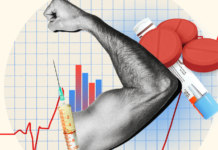Understanding the Side Effects of Anabolic Steroids
Anabolic steroids, also known as anabolic-androgenic steroids (AAS), are synthetic substances that mimic the effects of testosterone in the body. They are commonly used by athletes and bodybuilders to enhance performance and promote muscle growth. While they may offer short-term benefits, it’s important to be aware of the potential long-term side effects associated with their use.
The Short-Term Effects
When anabolic steroids are used in the short term, they can produce a range of effects on the body. These effects can vary depending on the specific steroid used, the dosage, and the individual’s response. Some of the common short-term effects include:
- Increased Muscle Mass: Anabolic steroids can stimulate protein synthesis, leading to an increase in muscle mass and strength.
- Improved Athletic Performance: Due to their ability to enhance muscle growth and reduce fatigue, anabolic steroids can improve athletic performance, including speed, power, and endurance.
- Enhanced Recovery: Anabolic steroids can accelerate the recovery process by reducing muscle damage and inflammation.
- Increase in Red Blood Cell Production: Some steroids can stimulate the production of red blood cells, which can improve oxygen delivery to the muscles and enhance endurance.
The Long-Term Effects
While the short-term effects of anabolic steroids may seem appealing, it’s crucial to consider the potential long-term consequences. Prolonged use of these substances can lead to a range of adverse effects on both physical and mental health. Here are some of the long-term effects associated with anabolic steroid use:
- Liver Damage: Anabolic steroids are metabolized by the liver, and prolonged use can result in liver damage, including liver tumors and hepatitis.
- Cardiovascular Complications: Steroids can have detrimental effects on the cardiovascular system, increasing the risk of heart attacks, strokes, and high blood pressure.
- Hormonal Imbalances: Prolonged use of anabolic steroids can disrupt the body’s natural hormone production, leading to hormonal imbalances. This can result in decreased fertility, testicular atrophy, and breast enlargement in males, and menstrual irregularities and masculinization in females.
- Musculoskeletal Issues: Steroid use can weaken the musculoskeletal system, increasing the risk of tendon and ligament injuries. It can also lead to bone loss and an increased susceptibility to fractures.
- Psychological Effects: Anabolic steroids can have profound psychological effects, including mood swings, aggression, irritability, and even psychiatric disorders such as depression and psychosis.
- Dependency and Addiction: Prolonged use of anabolic steroids can lead to dependency and addiction. Users may experience withdrawal symptoms when they try to quit, including fatigue, insomnia, loss of appetite, and depression.
Conclusion
While anabolic steroids may offer short-term benefits in terms of muscle growth and athletic performance, it’s important to consider the potential long-term effects they can have on your health. The risks associated with their use are significant and can impact various aspects of your physical and mental well-being.
If you are considering using anabolic steroids, it’s crucial to consult with a healthcare professional who can provide guidance and help you make an informed decision. It’s also important to prioritize natural methods of enhancing performance and muscle growth, such as proper nutrition, regular exercise, and adequate rest and recovery.
Remember, your long-term health and well-being should always be the top priority.


























